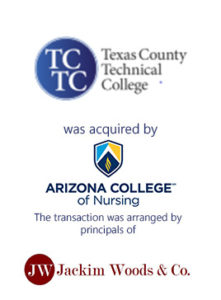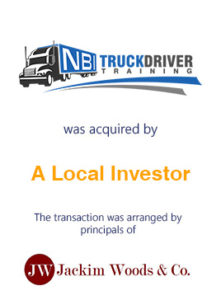
Private Equity Buyers Are Busy In Education Sector

Private equity investors have shown strong interest in education-focused companies in the last few years, and not just in edtech companies. Several things are responsible for this renewed interest.
- For the last 10 years, digital transformations in the classroom have caused the ed-tech market to soar and have led to an increased interest in all types of education-related investments.
- The U.S. faces a significant skill shortage across the board as our population gets older and as our society emphasizes professional careers over skilled-based careers. This had led to severe shortages in healthcare, the trades, and transportation.
- Approximately 30% of for-profit career colleges or vocational schools went out of business between 2008 and 2016, removing excess capacity from the post-secondary landscape, which led to a resurgence of interest from private equity groups.
- For the last four years, both the Republican administration and the Democratic Congress supported private education, which resulted in an upsurge in funding by federal, state, and local governments.
On top of that, the education industry is very fragmented, with many early childhood centers, career colleges, and training companies still owned by individuals, leaving private equity firms a lot of room for roll-ups to consolidate the industry and realize significant economies of scale.
In addition, the K-12 market has become more complicated, with new technologies rapidly changing the game. So having the right people in charge who know how to design and implement digital learning platforms is increasingly important, representing a unique opportunity for private equity and other tech-savvy investors. As a result, buyers and investors are spending more and more time developing world-class management teams to ensure their portfolio companies can provide teachers and students with the digital platforms and technical support they need to succeed.

For the past decade or so, buyers have been hesitant to invest in post-secondary education companies — ever since the Great Recession and implementing the Gainful Employment Rule during the Obama administration. However, things have turned around completely in the last four years for several reasons, including…
- Over 200 poorly run for-profit career colleges closed their doors before the 2017-18 academic year — continuing a long downward trend. But happily, at the well-run schools that survived, enrollment and revenue are rising again.
- The regulatory environment is more favorable because the Gainful Employment Rule has been greatly scaled back – even though it remains on the books for now.
- Most for-profit career schools are demonstrating better results regarding educational outcomes like gainful employment, making them more appealing to investors no matter the level of regulatory oversight.
- The education sector tends to do well in a recession. In general, post-secondary education does well when the economy slows down and unemployed people go back to schools, so education-related companies are a good hedge against recession in any investor’s portfolio.
- Valuations of early childhood centers, K-12 schools, and career colleges remain reasonable compared to other education sub-sectors like edtech.
- It isn’t just investors who’re interested in this space – lenders have returned as well. For example, Renovus Capital financed the Rasmussen acquisition with SunTrust, CIBC, and Bank of Ireland. NCK Capital financed its purchase of Tricoci in partnership with Greyrock Capital Group and NBH Bank.
That’s all good news for owners of education-related companies. Here are just a few of the deals in the education sector over the last few years —
- The Learning Experience, was purchased by Golden Gate Capital Partners Group-backed KinderCare Education, acquired Troy, Michigan-based Rainbow Child Care Center from Quad-C Management.
- Rasmussen College, a healthcare-focused career college system with 10,000 students across 22 campuses, was acquired by Renovus Capital Partners.
- The University of St. Augustine was acquired by Toronto’s Altas Partners in a deal worth $400 million.
- Allied Business Schools, which offers online real estate certification classes, was acquired by Colibri Group and Quad-C Management.
- Chicago-based Tricoci University of Beauty Culture was acquired by Dallas’s NCK Capital.
- Texas County Technical College in Houston, Missouri, was acquired by Arizona College.
- The National Business Institute of Florida was acquired by a private investor.
If you own an early childhood center, a Title IV career college, or a corporate training program and are interested in potentially selling, contact us at 224-513-5142 for a free, confidential, no-obligation discussion about the current market and your options.
 About the author: Rich Jackim, the managing partner of Jackim Woods & Co, is an experienced M&A attorney, investment banker, business broker who has sold over 100 businesses. He is also an education sector entrepreneur who founded and sold a professional training company, so he understands the industry and the sales process from both an owner and a buyer’s perspective. If you are thinking of selling your early childhood center, K-12 school, career college, or training program, he would be happy to speak with you. His direct dial number is 224-513-5142, and his email is rjackim@jackimwoods.com.
About the author: Rich Jackim, the managing partner of Jackim Woods & Co, is an experienced M&A attorney, investment banker, business broker who has sold over 100 businesses. He is also an education sector entrepreneur who founded and sold a professional training company, so he understands the industry and the sales process from both an owner and a buyer’s perspective. If you are thinking of selling your early childhood center, K-12 school, career college, or training program, he would be happy to speak with you. His direct dial number is 224-513-5142, and his email is rjackim@jackimwoods.com.

Tackling Growth Delusions When Buying a Business

There is no doubt about it, it can be exciting to buy a new business. However, in the process, it is very important that you don’t become unrealistic about future growth. Keep in mind that in the vast majority of cases, if a business is poised to quickly grow substantially, the seller would be far less interested in selling.
Richard Parker’s recent article for Forbes entitled “Don’t Be Delusional About Growth When Buying a Business” seeks to instill a smart degree of caution into prospective buyers. Parker notes that when evaluating a business and talking to the owner, many buyers come away with a sense that enormous growth is just “sitting there” waiting to be seized. In particular, Parker cautions those buyers who are buying into an industry that they know nothing about; those individuals should be very careful.
When buying into an industry where one has no familiarity, there can be a range of problems. The opportunities that you see may not have been tapped into by the existing owner for a range of reasons. You couldn’t possibly guess what these reasons might be without more of a knowledge base. Since you are an outsider, you likely lack the proper perspective and understanding. In turn, this means you may see growth opportunities that may not exist, as the seller may have already tried and failed. Summed up another way, until you actually own the business and are running it on a day to day basis, you simply can’t make a proper assessment of how best to grow that business.
The seductive lure of growth shouldn’t be the determining factor when you are looking for a business. A far more important and ultimately reliable factor is stability. The real question, the foundation of whether or not a business is a good purchase option, is whether or not the business will maintain its revenue and profit levels once you’ve signed on the dotted line and taken over. You want to be sure that the business doesn’t have to grow to remain viable.
As Parker points out, the majority of small business buyers will buy in a sector where they don’t have much experience, and that is fine. What is not fine is assuming that you can greatly grow the business. Of course, if new buyers can achieve that goal, that is great and certainly icing on the cake. But don’t depend on that growth.
In the end, everyone has some ideas that work and some that don’t. You may take over a business and, thanks to having a different perspective than the previous owner, are able to find ways to make that business grow. But realize that many of your ideas for growing the business may fail completely.
A professional business broker will be able to help you determine what business is best for you. A business broker will help keep you focused on what matters most and steer you clear of the mistakes that buyers frequently make when buying a business.
